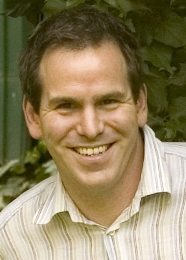13 February 2012
 Just one month into his appointment at the University of South Australia and Professor of Chemistry and Materials Science at the Mawson Institute, Dr Nico Voelcker, has won a prestigious Humboldt Research Fellowship to carry out a long-term research project in nanomaterials.
Just one month into his appointment at the University of South Australia and Professor of Chemistry and Materials Science at the Mawson Institute, Dr Nico Voelcker, has won a prestigious Humboldt Research Fellowship to carry out a long-term research project in nanomaterials.
In cooperation with two leading European institutions in the field of nanomaterials, the Leibniz Institute for New Materials in Germany and the Institute for Molecular Chemistry and Material Sciences (Institut Charles Gerhardt) in Montpellier, Professor Voelcker’s fellowship, Biointerfacing Nanostructured Silicon-Based Materials, is dedicated to developing urgently needed technologies for regenerative medicine, medical sensors and therapies on the basis of nanostructured silicon.
A distinguished young research professor with an outstanding track record, Prof Voelcker has international research experience ranging from the Scripps Research Institute in San Diego, theUniversity of Barcelona in Spain and the RWTH Aachen, one of Germany’s elite universities, where he completed his PhD.
A Tall Poppy Award holder, he has published over 160 peer-reviewed articles and book chapters in the field of nanomaterials in contact with biological systems and won more than AU$15 million in public and private research funding.
“I’m delighted to be part of a project that will strengthen UniSA’s research links with Europe and support the institutional goal to develop as one of the world’s leading and globally connected research institutions,” Prof Voelcker said.
“My research team investigates advanced nanostructured materials for applications in lab-on-a-chip devices, biosensors, biomaterials and drug delivery.”
“This work crosses the traditional disciplines of organic chemistry, surface and materials science, cell biology and biomedical engineering so is reliant on strong collaboration and shared expertise.”
“My core interest lies in biointerfaces where we explore the principles of interactions of biomolecules, cells and tissues to man-made surfaces including porous materials, in a bid to build knowledge in this field to ensure the successful development of innovative and life saving technologies.”
Prof Voelcker will also contribute to the development of new research-led teaching activities in the area of nanomaterials science and technology, including the University of South Australia’s new Bachelor of Science (Advanced Materials) program.
His laboratories will be based in the new $73 million landmark M2 building, the new hub for materials and minerals science in South Australia where leading research meets contemporary tertiary education and industry.
His appointment to the Mawson Institute bolsters the strength of UniSA’s Mawson Lakes campus in nanomaterials and adds to the recent success of UniSA in the university rankings in the disciplines of physical chemistry, chemical sciences and materials engineering. For example, the university was rated 5 (well above world standard) in the chemical sciences in the 2010 Excellence in Research for Australia exercise – making UniSA as one of only two universities in Australia to be awarded a 5 in this field.
The Mawson Institute aims to deliver and accelerate transformational change in South Australia's manufacturing base through a focus on the basic science and engineering that underpins “next generation” manufacturing, providing technology platforms based upon new knowledge and innovation that can be readily integrated into new products and processes.
Media contact
- Michèle Nardelli office (08) 8302 0966 mobile 0418 823 673 email michele.nardelli@unisa.edu.au




